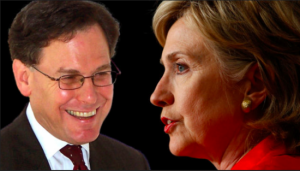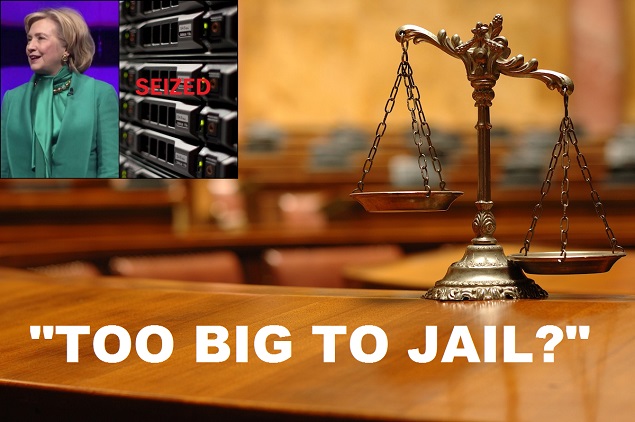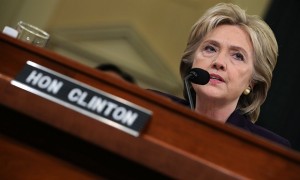Editor’s Note – It is clear that Hillary Clinton and her supporters have seemingly won a political victory but that does not erase the clear fact that she has lied, lied often, and lied about her lies under oath. Since Obama has ‘transformed’ the rule-of-law system we rely upon for a civil society and replaced it with rule by fiat and man, she may just get away with it.
We will never get closure on Fast & Furious, Benghazi, the IRS scandal, and so many other scandals if we allow this to continue. Is she ‘too big to jail’?
While former Secretary of State Hillary Clinton, currently a candidate for president of the United States, thinks she has dodged the Benghazi bullet (opinions still vary on that one) she is still under investigation for burbling classified information on her email server, states a Friday story in the McClatchy DC. As the Weekly Standard notes, at least one recently released email did contain classified data because part of it was redacted due to its being classified.
But one national security attorney named Edward McMahon Jr, claims flatly that Clinton is “too big to jail” regardless of her guilt or innocence in the matter.
Honorable???
The theory is that high-profile defendants such as Clinton get off for the same type of behavior that lower level officials go to jail for. The idea may come as a surprise to Scooter Libby, an aide for Vice President Dick Cheney, who was prosecuted for revealing the name of CIA analyst Valerie Plame to the media.
General David Petraeus, a former CIA director, was forced to plead guilty to a misdemeanor on the charge of mishandling classified documents when he showed them to his biographer, who also happened to be his mistress.
FBI Director James Comey, a Republican, would be the official who would recommend an indictment of Hillary Clinton. However Attorney General Loretta Lynch, an Obama appointee, would make the final approval. The situation sets up a nightmare scenario for the Democrats.
If Comey recommends an indictment and Lynch refuses, the charge of political justice follows as night follows day. On the other hand, if Lynch decides to indict, Hillary Clinton’s run for the presidency is, for all practical purposes, over.
The real nightmare kicks in if Hillary Clinton, under indictment, refuses to drop out, choosing instead to do what she always does and play the victim. In that case, Vice President Joe Biden, tanned, ready and rested, may not be able to pull the Democrats out of the fire. Hillary Clinton would make history as the first major candidate for president under criminal indictment. (Examiner)
If Americans blithely look the other way, and leaders do not restore the rule-of-law, why bother having any law? An oath was taken to faithfully execute the law, but that is now a mere oxymoron.
There are two videos to view, one on her discrepancies between her testimony and email releases, and also whether she is too big too jail:
State Department emails conflict with Clinton’s Benghazi testimony
By Catherine Herridge – Fox News
Newly released emails conflict with former Secretary of State Hillary Clinton’s 11-hour testimony before the Benghazi Select Committee, according to a review of the transcripts and public records. One of the conflicts involves the role played by Clinton confidant Sidney Blumenthal.
Regarding the dozens of emails from him, which in many cases were forwarded to her State Department team, Clinton testified: “He’s a friend of mine. He sent me information he thought might be of interest.
Some of it was, some of it wasn’t, some of it I forwarded to be followed up on. He had no official position in the government. And he was not at all my adviser on Libya.”
But a newly released email from February 2011 shows Blumenthal advocated for a no-fly zone over Libya, writing, “U.S. might consider advancing tomorrow. Libyan helicopters and planes are raining terror on cities.”
Re-examining Hillary Clinton’s Benghazi testimony:
%CODE%
The email was forwarded by Clinton to her deputy chief of staff Jake Sullivan with the question, “What do you think of this idea?”
 A second email from former British Prime Minister Tony Blair in March 2011 also advocated for a no-fly zone, with Blair stating, “Please work on the non-fly zone, or the other options I mentioned. Oil prices are rising, markets are down. We have to be decisive.”
A second email from former British Prime Minister Tony Blair in March 2011 also advocated for a no-fly zone, with Blair stating, “Please work on the non-fly zone, or the other options I mentioned. Oil prices are rising, markets are down. We have to be decisive.”
In the end, Clinton advocated for the no-fly zone and was able to gather support within the Obama administration to implement it.
In another email from March 5, 2012, Clinton appears to use Blumenthal as what is known in intelligence circles as a “cut out,” a type of intermediary to gather information, allowing the policymaker plausible deniability.
In this case, the emails focused on the increasingly chaotic and fragmenting political landscape in Libya after dictator Muammar Qaddafi was removed from power.
In the one-page document, Blumenthal writes that Jonathan Powell, a former senior British government adviser to Blair, is “trying to replicate what we did in Northern Ireland by setting up secret channels between insurgents and government, and then, where appropriate, developing these negotiations.”
This type of backchannel discussion helped bring about the 1998 Good Friday peace agreement in Northern Ireland.
Clinton responded two hours later. “I’d like to see Powell when he’s in the building,” with her staff responding, “Will follow up.” In both instances, Clinton’s actions further undercut sworn testimony to the Select Committee that Blumenthal was “not at all my adviser on Libya.”
Another area of conflict involves security and aid requests. In an exchange with Republican Rep. Mike Pompeo, R-Kan., Clinton told the House committee none of the requests for diplomatic security reached her.
“Too big too jail?”
%CODE2%
“That’s over 600 requests,” Pompeo said. “You’ve testified here this morning that you had none of those reach your desk; is that correct also?”
Clinton responded, “That’s correct.”
However, the State Department website, under a section on embassy security, states that the secretary has overall responsibility for the well-being of personnel on assignment. The buck does not stop with “security professionals” as Clinton has testified.
It states: “The Secretary of State, and by extension, the Chief of Mission (COM), are responsible for developing and implementing security policies and programs that provide for the protection of all U.S. Government personnel (including accompanying dependents) on official duty abroad.”
Yet, the new emails show a request for humanitarian aid sent by the late Ambassador Chris Stevens did reach her desk. The Aug. 22, 2011 email from Stevens was circulated among Clinton staff and delegated for action in under an hour.
With the overthrow of Qadaffi, Stevens wrote that the Libyan opposition, known as the TNC, would soon release a statement saying it would “insure the delivery of essential services and commodities (esp. addressing the acute shortages of fuel, children’s milk, and medication for blood pressure and diabetes).”
Seventeen minutes later, Clinton responded, “Can we arrange shipments of what’s requested?”

While the request for humanitarian aid from Stevens did reach her office, during her testimony, Clinton emphasized, “Chris Stevens communicated regularly with the members of my staff.
He did not raise security with the members of my staff. I communicated with him about certain issues. He did not raise security with me. He raised security with the security professionals.”
The emails also further depict Clinton’s treatment of sensitive material. A February 2012 email shows Clinton sent an urgent message to an office manager that a white briefing book, used for sensitive and classified information, was left on her desk.
The office manager confirmed when it was correctly stored in the State Department safe.
The 7,000 pages released Friday leave no doubt that Clinton’s personal account mingled information now considered classified with the mundane such as social media requests and the taping of a television period drama.
On Feb. 1, 2011, Clinton sent a “Linkedin” request from a “Susan Kennedy” to a State Department IT specialist asking, “How does this work?”
An email from Feb. 23, 2012, from the State Department’s senior official on Near Eastern Affairs, Jeffrey Feltman, called “Bingo!” is fully redacted, citing the B1 exception which is classified information.
And in January that same year, Clinton wrote to an aide, “I’m addicted to Downton Abbey which runs on Sunday night and reruns on Thursday at 8pmb. Since I missed it Sunday and will again tomorrow so wondering if we could tape a DVD for me.”
President Obama, meanwhile, is now under scrutiny after having told CBS’ “60 Minutes” he was not aware of Clinton’s personal account – even though the White House said Friday there are emails between the two, only they will not be available under FOIA requests until after Obama leaves office.
In the “60 Minutes” interview, when asked if he knew about Clinton’s use of a private email server, Obama twice said, “No.”
At this point, between 600 and 700 emails have been identified containing classified information. An intelligence official familiar with the review says there is no such thing as “retroactive classification,” the information is born classified, and the State Department only has the right to declassify information it produced.
While Clinton testified that 90-95 percent of her emails were captured by the State Department system, and nothing she sent or received was “marked classified,” the State Department said that estimate represents the campaign’s data and not their own.
Catherine Herridge is an award-winning Chief Intelligence correspondent for FOX News Channel (FNC) based in Washington, D.C. She covers intelligence, the Justice Department and the Department of Homeland Security. Herridge joined FNC in 1996 as a London-based correspondent.


